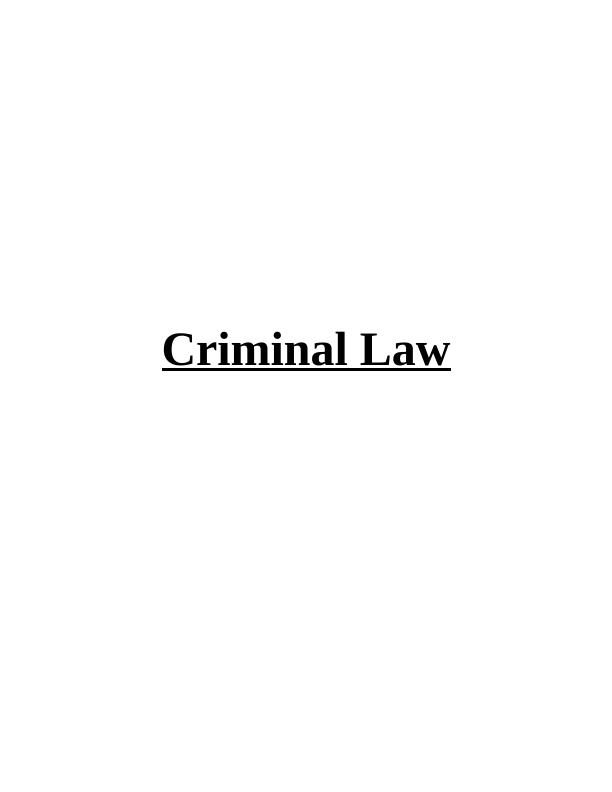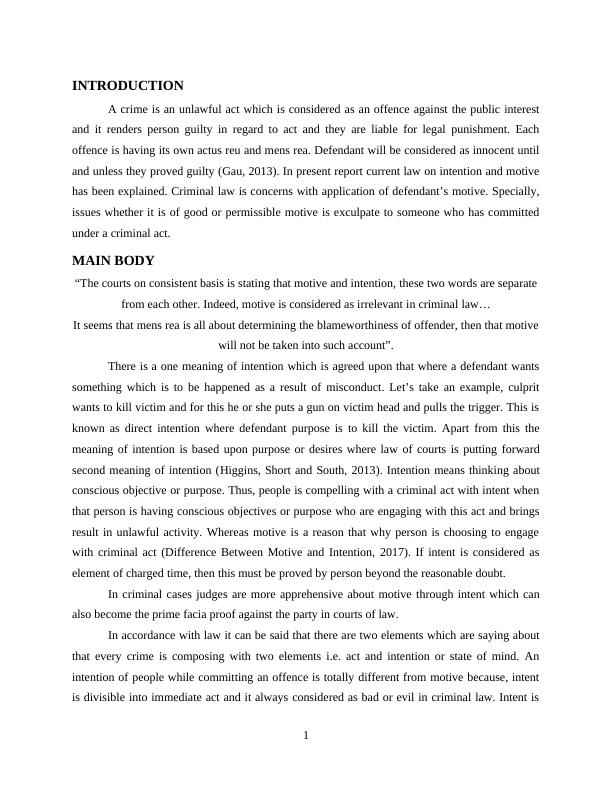Current Law on Intent
Added on 2020-06-04
6 Pages1732 Words401 Views
Criminal Law

Table of ContentsINTRODUCTION...........................................................................................................................1MAIN BODY..................................................................................................................................1CONCLUSION................................................................................................................................3REFERENCES................................................................................................................................4

INTRODUCTIONA crime is an unlawful act which is considered as an offence against the public interestand it renders person guilty in regard to act and they are liable for legal punishment. Eachoffence is having its own actus reu and mens rea. Defendant will be considered as innocent untiland unless they proved guilty (Gau, 2013). In present report current law on intention and motivehas been explained. Criminal law is concerns with application of defendant’s motive. Specially,issues whether it is of good or permissible motive is exculpate to someone who has committedunder a criminal act. MAIN BODY “The courts on consistent basis is stating that motive and intention, these two words are separatefrom each other. Indeed, motive is considered as irrelevant in criminal law...It seems that mens rea is all about determining the blameworthiness of offender, then that motivewill not be taken into such account”. There is a one meaning of intention which is agreed upon that where a defendant wantssomething which is to be happened as a result of misconduct. Let’s take an example, culpritwants to kill victim and for this he or she puts a gun on victim head and pulls the trigger. This isknown as direct intention where defendant purpose is to kill the victim. Apart from this themeaning of intention is based upon purpose or desires where law of courts is putting forwardsecond meaning of intention (Higgins, Short and South, 2013). Intention means thinking aboutconscious objective or purpose. Thus, people is compelling with a criminal act with intent whenthat person is having conscious objectives or purpose who are engaging with this act and bringsresult in unlawful activity. Whereas motive is a reason that why person is choosing to engagewith criminal act (Difference Between Motive and Intention, 2017). If intent is considered aselement of charged time, then this must be proved by person beyond the reasonable doubt. In criminal cases judges are more apprehensive about motive through intent which canalso become the prime facia proof against the party in courts of law. In accordance with law it can be said that there are two elements which are saying aboutthat every crime is composing with two elements i.e. act and intention or state of mind. Anintention of people while committing an offence is totally different from motive because, intentis divisible into immediate act and it always considered as bad or evil in criminal law. Intent is1

End of preview
Want to access all the pages? Upload your documents or become a member.
Related Documents
Theories of Criminal Law -lg...
|17
|4620
|17
Criminal Law: Murder and Defenceslg...
|12
|3002
|428
CRIMINAL LAWlg...
|5
|444
|100
Criminal Law Assignment - Criminalizing Unlawful Act Manslaughterlg...
|7
|1908
|39
Section 300 of Criminal Code Act, 1899 | Criminal Lawlg...
|16
|2874
|25
CRIMINAL LAW. CRIMINAL LAW Name of the Student: Name oflg...
|12
|3333
|39
